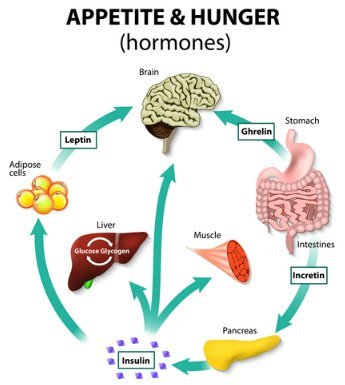11 Proven Benefits of Fasting (Weight Loss, Concentration, and More)
Intermittent Fasting is becoming one of the hottest trends in the fitness industry today and for good reason. There are numerous health benefits of fasting and reasons why it may work for you.
The only problem?
There is quite a negative stigma associated with “not eating.” People are still stuck in the mindset that eating 6 meals a day strokes some magical “metabolic fire” and helps burn more calories. It doesn’t (1).
There is no scientific proof that eating a certain amount of meals per day as a blanket approach is “better” than eating 1 meal or 3 meals or whatever.
To be honest, it really depends on the person, their body and hormones, their levels of physical activity, etc.
Think of it this way… If you’re one of those people who doesn’t feel hungry for a few hours after waking up, why would you cram a meal down your throat first thing in the morning just to “get your 6 meals in?”
Listen to your body.
But one thing we do know is that forgoing a meal or two can actually have some major health benefits. I say can because it really does depend on the person and how well their body responds to it.
This post may contain affiliate links, which helps keep this content free. Please read our disclosure for more info.
Fasting Does Not Mean Starvation
When we talk about fasting, we simply mean going a period of time without eating. Skipping a meal or two.
Sure, some people choose to do 5-day fasts or even 30-day fasts, but that is an entirely different thing. I suppose you could classify that as starvation.
In this article, we are specifically talking about two of the most common types of fasting:
- intermittent fasting (up to 16 hours; i.e. skipping one meal in the morning or evening)
- 24-hour method (not eating for 24 hours at a time; i.e. eating dinner one night and not eating until dinner the following night).
1. Helps You Lose Weight
Intermittent fasting in particular is really popular when it comes to losing weight. It’s actually a core principle of our fast weight loss program, the 21-Day Fat Loss Challenge.
It works for weight loss a variety of ways:
- Eat fewer calories (by skipping one meal)
- More conscious of the food that you do eat
- Positive impact on key weight loss hormones
- Helps the body preserve lean muscle tissue
Let’s talk about hormones and weight loss again for a second. Intermittent fasting is quite effective at optimizing hormonal responses.

Specifically, it can help improve your insulin sensitivity, boost your growth hormone (HGH), normalize your leptin, and can help with cellular discharge.
On top of that, it impacts the stress hormone, cortisol, which can also affect weight gain and weight loss. On that note, we’ll move on to our next benefit of fasting.
2. More Resistant to Stress
We all know stress is bad. We just tend to ignore the facts. But the fact is — chronic stress has been associated:
- Heart Disease
- Premature Aging
- Poor Skin Quality
- And just about every major disease known to man.
Multiple studies have shown that using intermittent fasting helps to enhance the body’s resistance to harmful stress (1, 2). It helps to fight free radicals by improving the body’s protective chemicals.
Do your best to manage your stress on your own, but also give fasting a try to help make your body a little more resistant to it.
I personally like intermittent fasting because it simplifies my mornings and the choices that I need to make surrounding food as well as the feelings I have after eating. Unloading anything on your plate and making you more conscious of how you are living your day can only help to improve stress as well.
3. Can Help Prevent Cancer
A bold claim, right? It seems like everything can help prevent cancer these days (or cause it).
But when it comes to the health and wellness world, I don’t think it’s that any one thing can cure cancer. It’s more that positive diet and lifestyle changes can only help.
In the case of whether it’s a benefit of fasting or not, the best study so far behind this claim is the positive effects fasting has on those going through chemotherapy.
People who received 4 cycles of chemo used 48-hour fasting protocols to minimize side effects. Shockingly enough, the only negative side effects reported were lightheadedness and hunger (1).
In addition, various animal studies have also shown positive effects including:
Please don’t believe that fasting alone can cure cancer or prevent it, but know that it IS a healthy lifestyle change that can help you make big strides towards making the right food choices that can have bigger impacts.
4. Improves Brain Function

The nerves and synapses in our brains are important to care of. I mean, obviously… It’s your brain. The more efficient these nerves and synapses are, the better. Drunk much?
Fasting has actually been shown to increase the growth of new nerve cells in the brain (1). Fasting has long been used in the health industry to help improve focus and concentration.
On top of that, it also increases the production of the brain protein (BDNF). This protein protects against Alzheimer’s disease and Parkinson’s (2).
As I stated a couple of points ago, I personally like fasting because it simplifies my day by allowing me to remove decisions, feelings, and emotions related to food (what kind you eat, where you eat it, preparation, how it makes you feel, etc.).
Try intermittent fasting with some coffee in the morning and see how you feel throughout your workday!
5. Improves Your Immune System
Fasting is a form of detoxing that can help you reduce inflammation in your body, especially when you pair it with actually detoxing from harmful foods. By reducing inflammation, the body becomes more resistant to common illnesses (1, 2).
A great way to reduce inflammation and spur on weight loss to shed the excess fat from your body is to fast regularly (intermittent fasting every day or most days and/or a 24-hour fast once a week) and also try a sugar or carbohydrate detox.
This will give your body a much-needed break from inflammation-causing foods and a chance to reset a bit.
P.S. That’s another major principle of our 21-Day Fat Loss Challenge that helps our clients lose 7-10 pounds in just the first WEEK of the program.
6. Increases Lifespan
Can fasting help you live longer? Basic studies in mice say so. Intermittent fasting in rats extends their natural lifespan. In some cases, rats that fasted lived up to 83% longer than those that didn’t (1, 2).
Although unproven in humans (we live for a long time to study), intermittent fasting is a good place to start if longevity is a goal.
Let’s already look at the list of previous benefits of fasting mentioned — nearly all of which can help you live a longer life:
- Weight Loss
- Stress
- Cancer
- Brain Function
- Immune System
So, when you look at it that way… It certainly can improve your health enough to increase your lifespan.
7. Improve Skin Health (Including Acne)
Fasting helps the body remove waste, particularly with damaged and dysfunctional cells. By speeding up the waste removal process (also called autophagy), you will notice improvements in your skin health (1, 2).
This also makes sense from the detox perspective that we mentioned earlier. Any kind of detoxification usually leads to some kind of improvements in the skin, which is the largest organ in your body.
8. Significantly Raises Growth Hormone Levels
Back to hormones again…
Growth hormone is a popular topic in the “sports science” culture. When professional athletes get caught using performance-enhancing drugs, growth hormone is usually on the list.
This is because it has so many benefits:
- Reduces recovery time from injuries
- Better lean muscle growth
- Greater fat burning
- And a smattering of other benefits
The crazy thing is: Intermittent fasting has been shown to raise growth hormone by up to 2000% (1).
9. Helps the body maintain lean muscle tissue when dieting
Lean muscle tissue = More burned calories at rest.
The problem is that when losing weight, muscle tissue is often collateral damage. Intermittent fasting causes less muscle mass lost than a typical calorie restriction diet (1).
More fat burning and less muscle burning!
10. Lowers the Risk of Deadly Diseases
Well, we mentioned cancer already, but what about heart disease and obesity — the big killers in modern culture.
Intermittent fasting helps with these too:
- Lowers blood pressure (1).
- Decreases cardiovascular disease risk (2).
- Improves cholesterol levels (3).
Remember that this goes hand-in-hand with what we have already discussed so far: conscious eating and diet improvements, reduced stress, detoxification, reduced inflammation, and more.
11. Improves Insulin Sensitivity
Finally, another huge problem in today’s culture is that we have become very insulin resistant.
Another benefit of fasting is that it can make the body more insulin sensitive, which means that you will absorb more nutrients from the food that you are eating.
Particularly with carbohydrates.
Most of today’s society has become very insulin resistant without even knowing it. It is also a big reason we talk so much about doing a carbohydrate detox when trying to lose weight.
During a fast, insulin is reduced by 20-31% (1). This is very beneficial to those who are looking to lose weight or who have pre-diabetes or diabetes. This also helps to facilitate better fat burning.
The carbohydrate detox paired with fasting is yet another core principle from our 21-Day Fat Loss Challenge.
Our clients lose an average of 10-21 pounds in just 21 days — but even better than the weight loss is the feedback we get from people about how the program has taught them how to change their eating habits and find a diet that truly works for them in the long-term.
We have over 4,000 women in our private support group doing the Challenge together, and every day they are sharing experiences, results, motivation, and lots of recipes!
If you are ready to make some changes in your life, this is the ONLY place you should start. We will teach you exactly how to make the necessary changes in your diet and your lifestyle and how to keep them “beyond the diet.”
Click here to start YOUR 21-Day Fat Loss Challenge today.
Leave a comment below if you enjoyed this article on the proven benefits of fasting or have any questions!


Can you work out daily while doing the intermittent fast? how often can you work out and for how long?
When is the best time to fast? And how long should I fast for?
When mudlims fasting month cones its best howevere u can fast when u want but good if for one Allah sake more effective